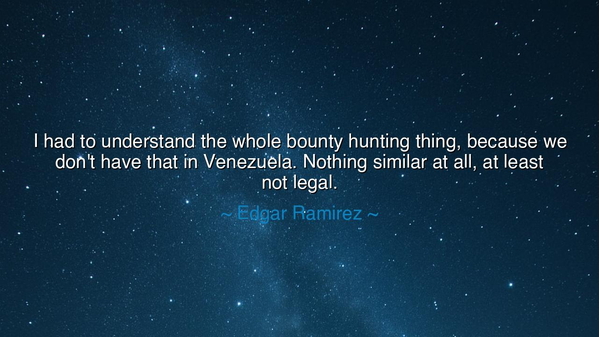
I had to understand the whole bounty hunting thing, because we
I had to understand the whole bounty hunting thing, because we don't have that in Venezuela. Nothing similar at all, at least not legal.






Hear the words of Edgar Ramirez, who, preparing himself for a role, confessed with candor: “I had to understand the whole bounty hunting thing, because we don’t have that in Venezuela. Nothing similar at all, at least not legal.” In this statement, simple yet profound, we glimpse the vast difference between societies, their laws, and their customs. For one man’s norm is another man’s strangeness, and what is seen as justice in one land may be seen as chaos in another.
The practice of bounty hunting, as known in the United States, is the pursuit of fugitives by private individuals, who, sworn by contract, chase those who have fled the law. It is a blending of commerce and justice, where freedom is staked against money, and men make their living by bringing the lawless to heel. Ramirez, hailing from Venezuela, looked upon this custom with astonishment, for in his homeland, such power rests only in the hands of state authority. To him it was not only foreign but nearly unthinkable that private men could wield such force under the cloak of legality.
This contrast reminds us of the truth that law is a mirror of culture. In one place, the state guards all authority, fearing chaos if justice is dispersed among private hands. In another, trust is given to individuals, who are granted power to act where governments are slow. Neither is wholly perfect, for each bears both virtue and danger. The bounty hunter may bring swift justice, but he may also abuse his power. The state may ensure order, but it may also fall prey to corruption and delay. Thus the wisdom of Ramirez’s words lies not only in observation but in revelation: that law is not eternal stone, but shifting clay, shaped differently by every land.
Consider history’s echoes. In medieval Europe, kings relied on knights and sheriffs to hunt fugitives, for justice was seen as a sacred function of the crown. Yet in the young United States, with its vast frontiers and thinly spread sheriffs, the bounty hunter arose to fill the gap. He became a figure half-feared, half-celebrated, a lone rider with authority written not in crown or badge, but in contract and coin. This figure would never have fit within the tight hierarchies of Old World monarchies, but in the wild freedom of America’s frontier, he became almost inevitable.
Even in more recent times, we see this paradox. Nations differ greatly in how they pursue justice. Some turn to private agents, others to centralized police, still others to community councils. What Ramirez encountered was not merely the oddity of bounty hunting, but the broader truth that the pursuit of justice is not uniform—it is ever bound to culture, history, and necessity. To him, the notion seemed strange, perhaps even troubling, because in Venezuela the monopoly of force belongs to the state alone.
The lesson is clear: when you look upon the customs of another people, do not mock or reject them outright, but seek to understand. For what is strange to you is natural to another, and what you see as alien may in fact be born of wisdom adapted to different times and lands. Ramirez teaches us humility—the willingness to learn before judging, to inquire before condemning. In this way, one becomes not merely a citizen of his nation, but a citizen of the world.
Therefore, in your own life, practice this wisdom: when you encounter what is unfamiliar, whether in law, culture, or belief, pause to ask why it exists. Seek the story behind the custom, the history behind the practice. Guard yourself against arrogance, for to reject what you do not understand is to blind yourself. And remember always that knowledge of others deepens knowledge of oneself.
So let Ramirez’s words echo as teaching: what seems strange is not always wrong, and what seems natural is not always universal. The wise heart learns across boundaries, the open mind grows across cultures, and the humble soul discovers in every land a new reflection of humanity’s endless struggle for order, justice, and survival.






AAdministratorAdministrator
Welcome, honored guests. Please leave a comment, we will respond soon